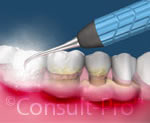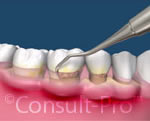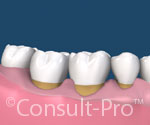
Periodontal disease is a bacterial infection that penetrates into the gums and into the bone around your teeth, causing inflammation. Periodontal inflammation leads to bone loss and possibly tooth loss and may contribute to other medical conditions.
The periodontal infection must be removed and the area given a chance to heal. There are generally two levels of treatment for this condition depending upon the severity of your infection.
Upper Level Infection Removal
The upper level of infection in the pockets around your teeth can be removed using specialized instruments. This procedure is called, “Scaling and Root Planing", “Phase One Treatment" or “Initial Therapy". It is done under local anesthesia and is quite different from the routine dental cleaning or “deep cleaning" that is traditionally done in the general dentist's office.
Lower Level Infection Removal
If your infection has spread into the bone that supports your teeth, and is below the level that can be reached in "Upper Level Infection Removal", then a surgical procedure must be performed to retract the gums and remove the lower level infection
| Upper Level Infection Removal (Scaling and Root Planing) |
|||||
|
|
||||
|
|
||||
|
|
||||
Practice Limited to Periodontics and Dental Implants
Tel: (770) 619-9929 • Fax: (770) 619-9932
4165 Old Milton Parkway, Suite 190 • Alpharetta, GA 30005
Contact Us • Directions





